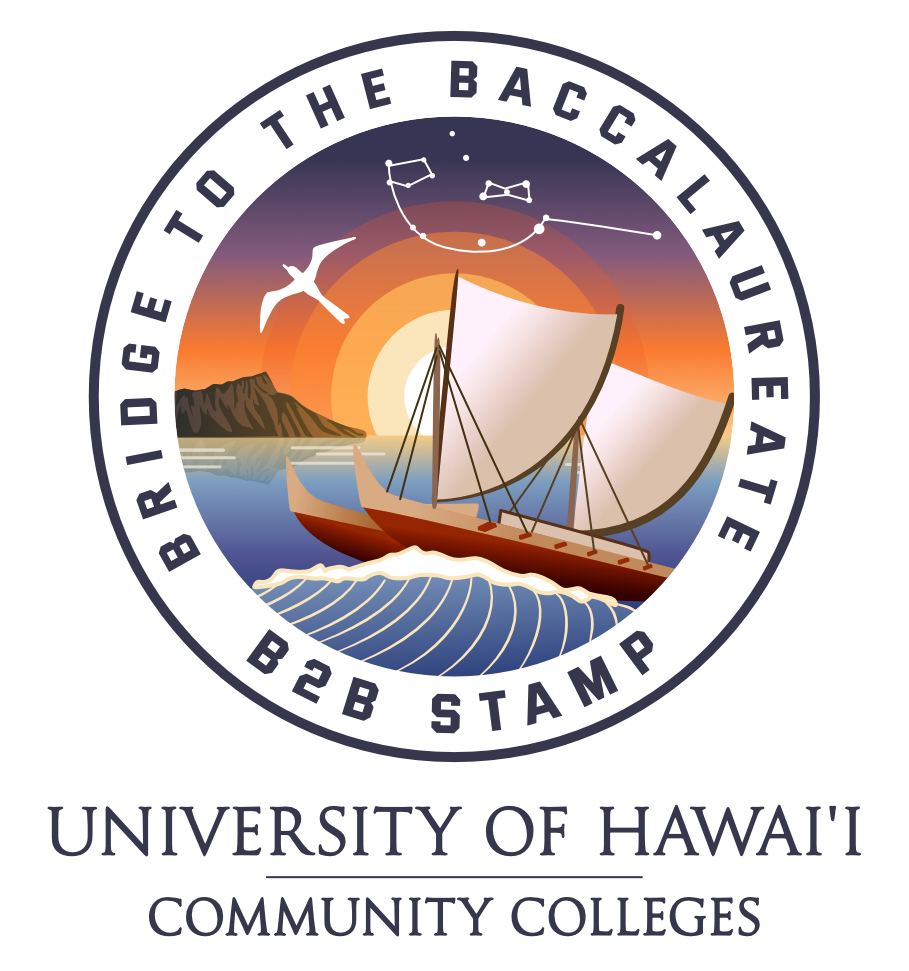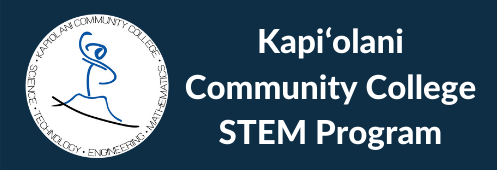LSAMP B2B: STAMP
Bridge to the Baccalaureate: Strategic Alliance for Minority Participation (STAMP)


Sponsored by the National Science Foundation
Program Overview
The ten-campus system of the University of Hawai’i (UH) consists of three major research institutions: UH Mānoa, UH Hilo, and UH West Oahu; six community colleges: Kapi’olani, Hawai’i, Honolulu, Kaua’i, Leeward, and Windward; and a four-year college: UH Maui College, which awards both associate and baccalaureate degrees. The proposed Bridge to the Baccalaureate: Strategic Transfer Alliance for Minority Participation (B2B STAMP) supports and advances STEM education and transfer at these six community colleges and UH Maui College. The proposed B2B STAMP program establishes a second LSAMP Alliance for the State of Hawai’i that will partner closely with the current Islands of Opportunity Alliance (IOA). B2B STAMP will implement proven strategies and activities to double the number of Native Hawaiian and other under-represented minority (URM) students annually transferring into baccalaureate STEM degrees, from 205 to 410. B2B STAMP will employ three strategies for success: 1) math acceleration for first year students, 2) peer mentoring, and 3) under-graduate research experiences (URE) for students as they mature academically in their sophomore year and transition to baccalaureate STEM degrees. By the end of this effort, 180 participants must be recruited. With comprehensive evaluation and student tracking, B2B campuses will demonstrate their ability to achieve institutional and UH system strategic plan measures. Achieving these measures will result in UH performance funding to support a strong, long-term B2B Alliance.
Intellectual Merit
Broader Impact
Strategies
Strategy 1: Peer Mentoring
The goal of peer mentoring opportunities is to foster collaboration between students and faculty as well as their own peers to excel in their academic journey. Peer mentors provide students with rich and innovative mentoring experiences that benefit not only themselves but also their mentees, inspiring them to succeed in their core STEM courses. Mentors are trained to support student success in courses, as well as URE projects. URM students will not only be engaged in academic advising with their peers, but will also participate and volunteer in monthly workshops focused on financial aid,
transfer, and internship and scholarship opportunities, in addition to outreach activities to K-12 students aspiring to become STEM majors. Innovation Highlight: Kapi’olani has employed a nationally recognized peer mentoring model where mentoring takes place primarily in their STEM Learning Center outside of class and frequently linked to a class section. Talented STEM students are hired as mentors with two specified roles. First, they provide general tutoring and mentoring to student walk-ins to the STEM Center. When they have demonstrated their mentoring skills and their abilities to be patient and nurturing with diverse student groups, they are directed to provide mentoring to a specific class section under the supervision of the faculty teaching that section. This model will be shared across all B2B STAMP campuses for their implementation and project-wide evaluation.
Strategy 2: Undergraduate Research Experiences (URE)
B2B STAMP faculty and URE advisors will support STEM student learning through URE, and engage students in multi-disciplinary, place- and community-based URE projects. URE projects are designed to teach URM students to conduct literature searches and use the scientific knowledge gained in their STEM courses to perform a hypothesis-driven experiments using the scientific method. Innovation Highlight: A distinction is made in the B2B STAMP in that it is not the research itself that is the end goal. Rather, it is the experience of participating in scientific research at various levels that is critical to student learning. This URE model will be shared with and developed by the other B2B STAMP campuses for implementation and project-wide evaluation.
Strategy 3: Math Acceleration
To fortify the mathematics foundations of UH community college students in their first two years, B2B STAMP colleges will implement a math acceleration initiative, following selected best practices established by Complete College America: corequisite remediation, structured schedules and guided pathways to success. B2B STAMP goals will be realized through the following seven program objectives and corresponding activities outlined in the B2B STAMP Action Plan.
Accomplishments
After five years of grant implementation, 278 unduplicated under-represented students (112 males and 166 females) from Kapi’olani, Hawai’i, Honolulu, Kaua’i, Leeward, Windward Community Colleges and UH Maui College, have been impacted and supported by the Louis Stokes Alliances for Minority Participation award from the National Science Foundation.
A hundred and seventy-two students were engaged in Undergraduate Research Experience (URE), 84 students were engaged in Peer Mentoring (PM), and 22 were engaged in both activities; many were able to participate and to present their work in local, regional and national conferences to present their work such as:
- Kapi’olani’s Students Undergraduate Research Fair (SURF)
- Islands of Opportunity Alliance (IOA) symposium
- Emerging Researchers National Conference in STEM (ERN)
- American Indian Science and Engineering Society conference (AISES)
- National Diversity in STEM conference (SACNAS)
Out of the 278 B2B participants, 144 students (52%) transferred to a four-year institution, 49 of them also obtained a bachelor’s or higher degree, and 87 students (31%) are still pursuing a two-year degree in good standing at the collaborative community college partner institutions and expected to transfer by 2024.
The bachelor’s degrees obtained by B2B participants are in Engineering (9), Biology (8), Global Environmental Science (5), Applied Science (4), Physics/Astrophysics (3), Chemistry (3), Computer Science (2), Nursing (1), Molecular Cell Biology (1), Molecular Bioscience and Biotechnology (1), Medical Technology (1), Biochemistry (1), Applied Mathematics (1), Microbiology (1), and in non-STEM (5).
The bachelor’s and higher degrees currently sought by B2B participants are in Engineering (27), Biology (12), Global Environmental Science (5), Botany (5), Pharmacy (3), Computer Science (2), Chemistry (2), Kinesiology (2), Physics/Astrophysics (1), Public Health (1), Information Security (1), Health Science (1), Microbiology (1), Nursing – DNP – (1), and in non-STEM (13).
